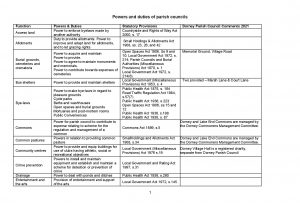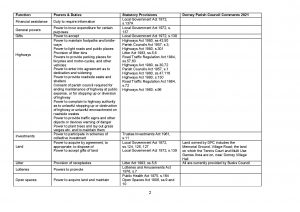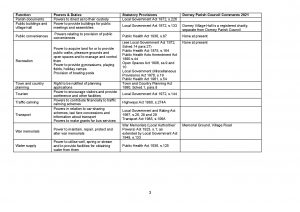 Dorney Parish Council is a statutory local authority established under the Local Government Act 1972. It operates in the area of a defined civil parish – Dorney.
Dorney Parish Council is a statutory local authority established under the Local Government Act 1972. It operates in the area of a defined civil parish – Dorney.
Who is on the council?
The council is made up of councillors elected by the electors of the parish. Every year the council elects one councillor to be the Chairman of the council. The council has a paid officer who organises meetings and helps to carry out the council’s decisions – this officer is known as the Clerk.
What powers do Parish Councils have?
Parish Councils have a wide range of powers which essentially relate to local matters, such as looking after community buildings, open space, allotments, play areas, some street lighting, bus shelters, car parks and much more. They also have the power to raise money through the council tax (precept).
A summary of Dorney Parish Council’s powers:


 To whom are they accountable?
To whom are they accountable?
The council is accountable to the electors of the parish. Elections to parish councils are held every four years. The council’s accounts are subject to scrutiny by the external auditor, but since the Standards Board for England was abolished, any alleged breaches of the Code of Conduct by individual councillors can be discussed initially with the Chairman of the Council to see if a resolution can be found, if not then the Bucks Unitary Council Monitoring officers can be consulted.
Can I attend meetings of the council?
Yes, all meetings of the council and its committees must be open to the general public and the press, except in very exceptional circumstances. The time and place of meetings must be advertised beforehand – usually on the parish noticeboard and website. The notice must be posted at least three days before the meeting.
Can I speak at the meeting?
You cannot, usually, speak whilst normal business (standing orders) is being conducted. However, nearly all councils allow some time at the meeting when standing orders are suspended, at which point the public are invited to address the council on an issue that concerns them.
How can I raise issues for debate at Council meetings?
Dorney Parish Council prides itself on its open and inclusive meetings, conducted in a relaxed environment where members of the public are encouraged to raise issues of importance or concern. Our meetings provide a useful opportunity for issues to be presented and discussed in public, and it is common for decisions to be deferred to give Councillors time to consider their position or to clarify points of ambiguity.
However, it is a matter of good governance that the Parish Council does not take decisions without proper consideration of the facts. This is especially important when it comes to matters of politics, as well as social and environmental issues, where views are increasingly polarised and not always within the remit of a Parish Council. It is standard practice that, for substantial issues to be considered by Councillors, background papers are provided by the person seeking to have a motion on the agenda.
If you would like to request any matter be debated at a council meeting in the future please contact the Parish Clerk via email: Clerk@dorneyparishcouncil.gov.uk or use our Contact Us page.
Can I see the minutes of council meetings and other papers?
Under the Freedom of Information Act 2010 you may see and have a copy of the ‘recorded’ information held by the council (unless it is classed as exempt information in the Act). This includes reports, minutes, correspondence and emails. The information has to be provided within 20 working days. There may be a photocopying charge.
How do people get elected to the council?
Elections are held every four years and will usually coincide with a Bucks Council election. A Public Notice of a forthcoming election will be placed on noticeboards and website.
There are occasions when the number of people who put their names forward for election is less than the required number of seats on the council. In these circumstances an election is not required and those who stood for election are deemed elected. In order to fill the vacancies, the council is required to co-opt other residents.
If a seat on the council becomes vacant between normal elections then a special procedure has to be followed which can lead to an election or, more usually, the co-option of a new councillor. It is good practice for a council to advertise widely in the parish if it is seeking to make a co-option.
What powers do Parish Councils have with respect to planning applications?
Parish Councils are consulted by the relevant Planning Authority (in Dorney’s case it is Buckinghamshire Council) on all planning applications. Any views expressed by the Parish Council will be taken into account by the Planning Authority before a decision is made, providing the points made are relevant to the determination of a planning application. However, the final decision is made by the Planning Authority, not the Parish Council.
Are councillors required to declare any financial or other personal interests?
Yes, all councillors have to abide by a Code of Conduct and declare any relevant interests.
